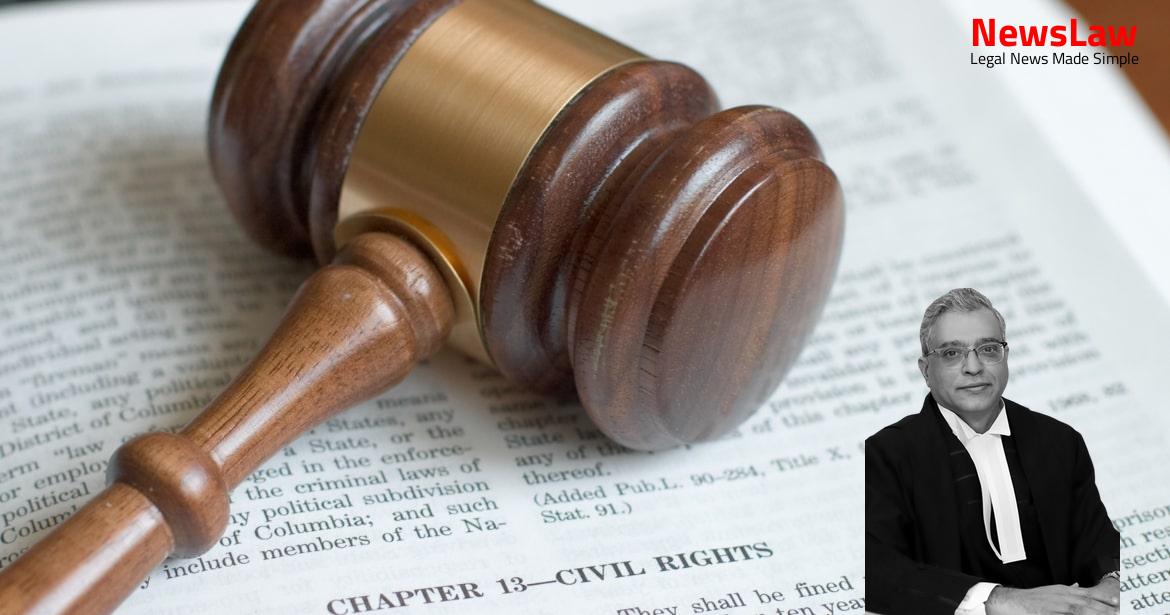In a groundbreaking decision by the Supreme Court of India, the case of R. Srinivas Kumar v. R. Shametha has set a precedent for divorce law in the country. The judgment addresses the complex issues surrounding irretrievable breakdown of marriage, paving the way for a new approach to marital disputes. This legal saga has spanned nearly two decades, with both parties entrenched in a bitter battle. Stay tuned for more insights into this significant legal development.
Facts
- Marriages are said to be made in heaven.
- Marriage between the parties was solemnized in Jalandhar on 23.4.2000, as per Hindu rites.
- Appellant’s family was apparently based in Jalandhar.
- Parties had a short period of stay together, with the respondent moving back and forth.
- Respondent left for Canada on 24.5.2001 without the appellant’s consent.
- Appellant claims respondent left for Canada to pursue immigration for him, while respondent states it was her own decision.
- Respondent obtained Canadian citizenship on 6.8.2002 without filing papers for appellant’s immigration.
- There was a fight between the parties after two and a half months of residing together, leading to respondent leaving again.
- Respondent’s interest in Canadian citizenship is highlighted by her actions.
- Appellant filed for divorce on grounds of cruelty on 16.5.2003.
- Panchayat intervened, asking parties to reside separately but it was not successful.
- Parties were unable to maintain a joint residence, leading to further complications.
Also Read: Supreme Court Judgment on Single Till Mechanism for HRAB Calculation: A Comprehensive Analysis
Analysis
- The dispute between the husband and wife has been ongoing for almost two decades with multiple court cases, including a divorce proceeding.
- Efforts to mediate the dispute have failed, and both parties seem to harbor feelings of resentment towards each other.
- The wife is adamant on not allowing the husband to obtain a divorce despite the irretrievable breakdown of the marriage.
- Various judicial pronouncements have granted divorce on the ground of irretrievable breakdown of marriage, even without mutual agreement.
- Both parties have made serious allegations against each other, including abandonment, dowry, physical assault, and extra-marital affairs.
- Despite attempts at counseling and mediation, there is no willingness from either party to reconcile or live together.
- The court opines that the marriage has become emotionally dead, beyond salvage, and irretrievably broken down.
- The divorce laws in India are still based on the ‘fault theory’ and do not explicitly include irretrievable breakdown of marriage as a ground for divorce.
- The court has considered various complaints and counter-complaints from both parties but finds no substantial evidence to support them.
- The counselor’s report highlights the bitterness and cynicism in the relationship, indicating no signs of affection or bonding between the parties.
- Continuing the marriage is deemed fruitless and causing emotional trauma to both parties.
- Efforts to persuade the parties to reconcile have been fruitless, with both parties showing no willingness to stay together.
- The court suggests that if both parties agree, they can seek divorce by mutual consent or approach the court for a resolution.
- The judge’s observations on ‘wear and tear of marriage’ and ‘inflamed passions’ are noted, but the court emphasizes the grounds for irretrievable breakdown of marriage in this case.
- Despite no consent from one party, the court acknowledges the untenable nature of the marriage due to lack of willingness from both sides to reconcile.
- In a recent judgment of the Court (R. Srinivas Kumar v. R. Shametha), divorce was granted on the ground of irretrievable breakdown of marriage.
- The judgment examined various judicial pronouncements before arriving at the decision.
- The court believes that ending the marriage after two decades of legal battles would allow both parties to move on in their lives.
- There is hope for a better life for both parties, even at their age, if they separate.
- The court hopes that with the divorce, both parties will reconsider continuing other legal proceedings and strive to resolve them as well.
- The respondent, who is a qualified lawyer, has been solely focused on battling this litigation rather than utilizing her legal skills for her own benefit.
- The court invokes Article 142 of the Constitution to achieve ‘complete justice’ between the parties, even when the law may not provide a direct remedy.
Decision
- Jurisdiction under Article 142 of the Constitution of India is exercised to grant a decree of divorce and dissolve the marriage between the parties.
- The appellant is paying Rs.7,500 per month to the respondent.
- The maintenance of Rs.7,500 per month is to be continued to be paid by the appellant.
- The parties can seek appropriate proceedings for enhancement, reduction, or cessation of this maintenance.
Also Read: Selection and Appointment of Judicial Officers in Himachal Pradesh
Case Title: MUNISH KAKKAR Vs. NIDHI KAKKAR
Case Number: C.A. No.-009318-009318 / 2014



